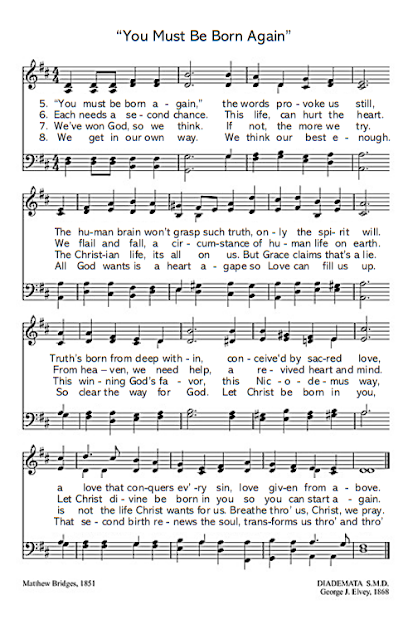Born-Again for Mainliners, Part 1
On this day when time in a sense is born again, I begin with a question Have you ever been "born again?”
It is a question that in my family was
somewhat common to ask or hear asked. My parents were part of the born again movement which reached its peak in the 1970's and 80's.
The term “born again” comes straight from
scripture. I just read it to you. Jesus tells Nicodemus, you must be born
again.
The
Common English Bible which I read from
translates it, “Born Anew” which I kind of like.
Either
way, there are two births according to Jesus in his discussion with Nicodemus.
There is the physical, human birth from a mother’s watery womb here on earth.
This the "born of water" Jesus mentions. And then there is a second birth, "born of the Spirit," a
spiritual birth that is sourced in heaven, sourced in the Spirit of God.
Jesus
is pointing to that second birth, and is saying that birth is vital for the
heavenly life, the eternal life.
For
those who want to be part of the community of God, for those who want to be
part of the community that will see heaven and heaven brought to earth, a spiritual birth,
being born again in the Spirit is required.
In
the context I grew up in, there was another question sometimes asked – when was your
spiritual birthday? It was a way of asking when were you born again? It may
sound sort of silly. But it does highlight the importance of the born again
experience in the Evangelical context. And there’s something to learn for us.
What I am saying here is that we shouldn’t
ignore Christ’s teaching to Nicodemus. Even us Mainliners should embrace this
call to be born anew.
You
don’t have to be an Evangelical to consider or even internalize Jesus’ words.
We can be proudly open and affirming UCC, mainline Christians and embrace the
language of being born anew.
The
question is how, right? How do we claim being born anew while holding to a
moderate to progressive view of the Christian faith? That question of what a
Born Anew UCCer looks like will be the theme for the next few Sundays.
For the rest of our time today, let me ask the question why? Why is being born anew important to us here. In many ways, the hymn we will sing answers that, but let me just say this here and now:
We live in an age of a Nicodemus approach to faith.
Nicodemus
comes to Jesus at night, so to be conspicuous about his curiosity about Jesus.
As a respected, educated person, he doesn’t want to be seen seeking out Jesus,
a lowly Galilean itinerant preacher. He doesn’t want people knowing about his
appreciation and admiration of Jesus. And he certainly isn’t about to put aside
his pride and follow Jesus.
See,
Nicodemus believes in his self-sufficiency and status more than he does in
God’s grace and love. He believes he’s won God’s favor through sheer self-will
and good deeds. What's more, he believes he is being a good leader by assuring Jesus passes
his own God self-sufficiency test.
But Christ
tells Nicodemus that is not what God wants first and foremost. Jesus
says God wants a transformed heart, a reborn spirit, not merely
self-improvement or an enhanced spiritual state.
Us
mainliners tend toward the Nicodemus way of things, don’t we? We don’t wear our
heart on our sleeves. We don’t necessarily hide our faith, but we keep it close to
the vest, as they say. In our increasingly secular world, we sometimes maybe
hide our love for Jesus, our faith in and following of Christ.
Like
Nicodemus, and as New Englanders, maybe we cling to the ideal of
self-sufficiency, and hold onto our good deeds as something qualifying God's favor.
I’m
not condemning anyone here. But I do want to say that as with Nicodemus, Jesus
might say to us, what I want most is your heart. I want spiritual
transformation. I want a letting go of ego and pride so I can be born in you.
Years
ago I left the Evangelical faith. I upset folks in my family when that
happened. They still pray for my salvation. And I'm still recovering from the wounds from that part of my childhood. But I cannot help but to carry the Evangelical sensibility with me. I also carry
memories of teachings. One such memory is a quote from the minister I grew up
hearing. He said the Christian life is not me working hard to please God. The
Christian life is Christ’s life working through us.
That
Christian life of Christ’s life working through us begins with Christ being
born in us. Christ born in us - that is what born again means. And then Christ
grows in us and Christ’s life works through us.
So I end as I began – are you born again? I pray the answer is a yes and a proud yes.


Comments
Post a Comment